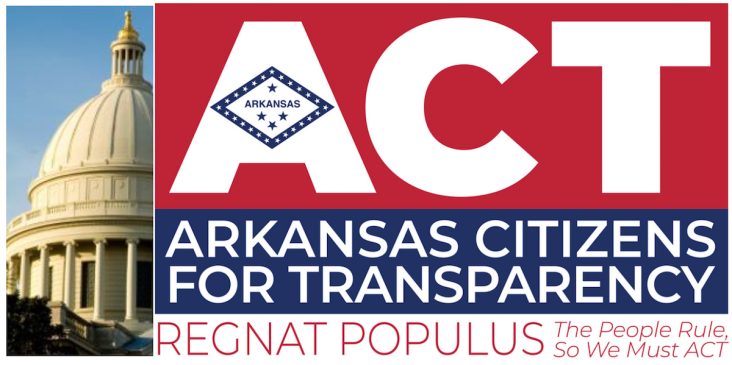Transparency group posts draft FOIA constitutional amendment
by October 11, 2023 3:07 pm 705 views

Arkansas Citizens for Transparency on Wednesday (Oct. 11) unveiled an amendment draft that would ensconce the state’s Freedom of Information Act (FOIA) into the state constitution. The move follows Gov. Sarah Sanders’ attempt earlier this year to weaken the FOIA.
The draft not only seeks to make the existing FOIA part of the constitution, but would better define a public meeting and add harsher penalties for those who violate the law.
“Arkansas has had one of the strongest Freedom of Information Acts in the country for 56 years,” said Sen. Clarke Tucker, D-Little Rock, and chair of the Constitutional Amendment Drafting Committee. “Taking this vote to the people, who we know value government transparency, will ensure the law remains strong for years to come.”
The group must collect 90,704 valid voter signatures to get the amendment on the 2024 general election ballot. The amendment language also must be approved by Arkansas Attorney General Tim Griffin. With approval from the AG, the group submits its petition form to the Secretary of State’s office and must collect and submit enough valid signatures approved by July 2024.
Specifically, the amendment seeks to do the following things:
• Enshrine in the state constitution the Arkansas Freedom of Information Act as it existed on Sept. 1, 2023.
• Ensure that any further changes to the FOIA that reduce government transparency may only be approved by a vote of the people of Arkansas, while providing that laws that increase government transparency may be passed by the General Assembly.
• Change as little as possible in the existing FOIA, with the primary exception being to provide a definition for “public meeting,” which has been a hole in the FOIA.
• Safeguard the ability of any citizen of Arkansas to enforce the FOIA by protecting the ability to recover attorneys’ fees in the event that a FOIA request is wrongfully denied.
• Create a penalty for bad actors who knowingly violate the FOIA.
• Account appropriately for the security of public officials and their minor children, balanced with the public’s right to know how tax dollars are spent.
• Keep the amendment language as simple as possible while taking into account the vast number of laws existing in the Arkansas Code affecting government transparency.
The group, which includes members from across the political spectrum, included this statement in Wednesday’s announcement:
“It has become clear in recent years that it is critical to enshrine government transparency in Arkansas, regarding public records and public meetings, in our state constitution. Arkansas has been a national leader in government transparency since 1967, when Gov. Winthrop Rockefeller led the way for the enactment of the Arkansas Freedom of Information Act. We, the undersigned, believe strongly that Arkansas should maintain, and even strengthen, our position of leadership on this vital issue. We further believe that having an open and transparent government is a right, and rights belong in the constitution. For that reason, this group has come together – in spite of our varied, and in some cases fundamentally opposed, political perspectives – to propose the Arkansas Government Transparency Amendment.”
Members of the drafting committee include Sen. Clarke Tucker, Chairman; former Republican (now Independent) State Representative Nate Bell; Little Rock attorney David Couch; Bentonville attorney Jennifer Waymack Standerfer; University of Arkansas William H. Bowen School of Law professor Robert Steinbuch; Little Rock attorney John Tull III; and Arkansas Press Association Executive Director Ashley Kemp Wimberley.
Link here for a PDF of the draft amendment.
THE SPECIAL SESSION
The Arkansas General Assembly was called into special session on Sept. 11 to consider bills related to tax rate changes and what was then a bill that included broad changes to the state’s FOIA.
Gov. Sarah Sanders initially asked for a bill that would change FOIA provisions by including the federal exemption that would significantly limit the information available about the deliberations of officials at state agencies, recommendations about policy, and other governance matters. She said, at the time, the effort was about making state government more efficient.
The original bill would also exempt from FOIA any records about “planning or provision of security services provided to the Governor, the Lieutenant Governor, the Attorney General, the Secretary of State, the Auditor of State, the Treasurer of State, the Commissioner of State Lands, members of the General Assembly, Justices of the Supreme Court, or Judges of the Court of Appeals.”
The security issue primarily involved details about who uses the state plane, which is operated by the Arkansas State Police (ASP). The plane is used by Arkansas governors to travel in state. Travel records related to the plane are part of a lawsuit filed by Little Rock attorney Matt Campbell to seek records requested per the FOIA from the ASP. The lawsuit was dismissed for reasons not related to the validity of the case.
The bill eventually approved in both chambers included only the security provisions and a retroactivity clause that made the exemptions retroactive to June 1, 2022. The previous bills had the retroactive provision at Jan. 1, 2022. When she signed the bill, Gov. Sanders said she was not finished seeking FOIA changes.
